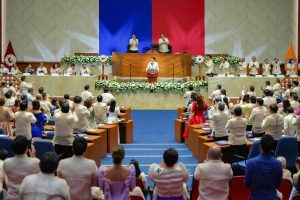Philippine President Ferdinand Marcos Jr. has announced a ban on online gambling operations, accusing them of connection to a variety of crimes, including murder, kidnapping, online scams, human trafficking, and torture.
In his annual State of the Nation address, Marcos said that the ban would take effect immediately, but that he had given the country’s gaming agency until the end of the year to wind down these operations.
The announcement, which drew loud applause and a a standing ovation from the joint session of Congress, follows growing calls to ban Philippine Offshore Gaming Operators, known commonly as POGOs, due to their alleged links to organized crime.
“Disguising as legitimate entities, [POGO] operations have ventured into illicit areas furthest from gaming such as financial scamming, money laundering, prostitution, human trafficking, kidnapping, brutal torture, even murder,” Marcos said in his address. “The grave abuse and disrespect to our system of laws must stop.”
He added, “Effective today, all POGOs are banned.”
As Felix Domini Iglesias noted in an article this month for The Diplomat, a POGO is a business entity “that participates in offshore gaming services by offering online games, taking bets, and paying the winning players – but only to customers based outside of the Philippines.” In practice, most of these are run by Chinese nationals and serve customers in mainland China, where gambling is banned outside Macao.
These operations are believed to employ as many as 25,000 Filipinos, in addition to an unknown number of Chinese nationals. In his speech, Marcos vowed to work with the Department of Labor and Employment to help former POGO workers find alternative employment.
While POGOs have been present in the Philippines for around two decades, they proliferated under the presidency of Rodrigo Duterte (2016-2022), which threw open the doors to Chinese investment, and have continued to expand in the two years since Marcos took office. There are now an estimated 400 POGOs across the Philippines, many of them based in high-rise apartment blocks in Manila and other large cities. At its height, POGOs employed more than 300,000 Chinese workers.
At the same time, Asia’s booming casino business has been closely linked to organized criminal activities, particularly sophisticated “pig butchering” scam operations, which have also metastasized over the past few years in Myanmar, Laos, and Cambodia. POGOs have been a subject of concern in the Philippines for some time, with one prominent member of the Senate putting forward a bill banning the operations. Others argue that the industry might pose a national security risk.
In the past, the crackdown was hampered by the money that has flowed to the Philippine Amusement and Gaming Corporation (PAGCOR), which is expected to receive 24.5 billion pesos ($417 million) in POGO fees and taxes this year. (Duterte at one stage defended the industry on these grounds.) But a rapid growth in unlicensed gambling operations is depriving the government of even this pecuniary benefit. PAGCOR’s chairman Alejandro Tengco told Reuters recently that there are between 250 and 300 illegal POGOs operating in the country, compared with 46 officially licensed operations.
Marcos’ announcement comes amid an ongoing Senate investigation into POGOs and their links to organized crime. The investigation centers on the identity and activities of Alice Guo, the mayor of Bamban, a town in Tarlac province on the island of Luzon. In February and March, the authorities raided two POGOs operating on a Bamban property allegedly owned by a company belonging to Guo. The raid in March resulted in the arrest of nine individuals involved in scam-related activities and illegal human detention and rescued more than 800 victims of human trafficking.
During the investigation, the lead investigator, Senator Risa Hontiveros, has presented documents alleging that Guo is a Chinese national named Guo Huaping, who faked her identity as a Filipino. This has stoked the long-standing fears that POGOs might serve as cover for Chinese espionage operations.
Guo has denied any wrongdoing but has been suspended from her post and had her financial assets ordered frozen. She has since disappeared. Last week, the Senate President Francis Escudero signed warrants for the arrest of Guo and several members of her family for snubbing the Senate POGO inquiry.
For its own part, Beijing has urged the Philippines to institute a total ban on POGOs, highlighting their links to criminal activities. Last month, the Chinese Embassy in Manila issued a statement calling on the Philippines “to ban POGO at an early date so as to root out this social ill,” the embassy statement said.
Around the same time, the Philippine authorities announced a crackdown on illegal POGOs, but Marcos’ announcement suggests that the government is no longer willing, or able, to draw a distinction between legitimate and illicit gambling operations. Indeed, the scale of the criminal activity uncovered in Bamban – and this was not the only such case – suggests that the benefits of the legal operations are not worth the trouble, even if it may take time, and considerable amounts of investigative resources, to root out the illegal operations.
In a statement yesterday, Hontiveros called Marcos’s move a “victory for the entire nation.”
“POGOs have brought innumerable and unspeakable social ills into the country,” she said in a statement. “Our Senate hearings will continue to demand accountability. We will also continue to ensure that we strengthen policies that would prevent industries like POGOs from ever emerging again.”

































